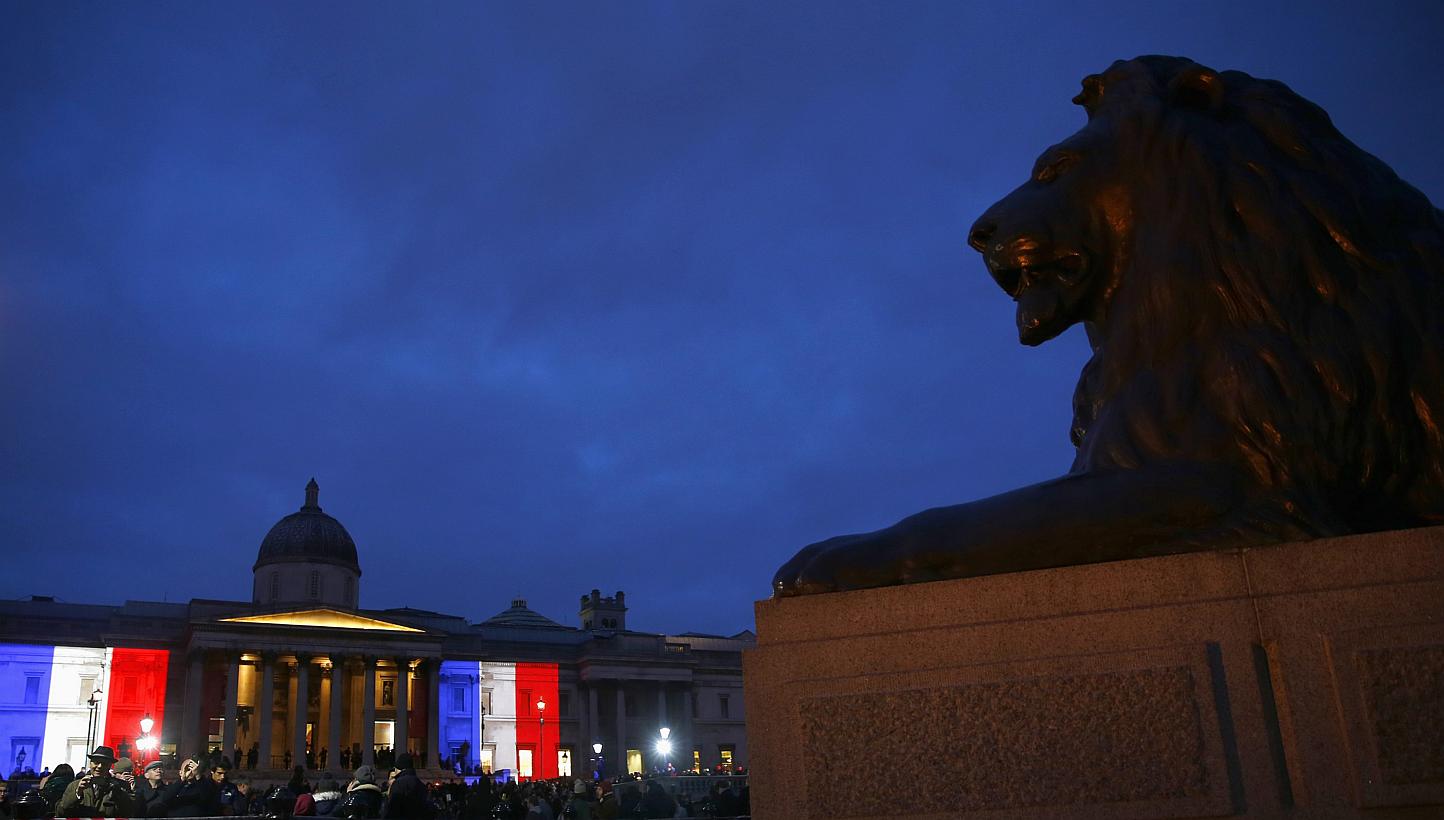British editors' right not to republish offending cartoons
Sign up now: Get ST's newsletters delivered to your inbox

The colours of the French national flag are seen in Trafalgar Square as they are projected in tribute to the victims of the Paris terror attacks on the The National Gallery in London on Jan 11, 2015. Clearly, some journalists do believe that in such extreme circumstances, it was necessary to show solidarity with the murdered French cartoonists by republishing their images. British national newspaper editors, who are hardly noted for their unwillingness to publish and be damned, collectively decided otherwise. -- PHOTO: REUTERS
Roy Greenslade
Why did the British press, unlike some newspapers elsewhere in Europe, refuse to republish the caricatures of Prophet Muhammad that led to the slaughter of 12 Charlie Hebdo staff?
The simplest answer is that freedom is, or should always be, tempered by responsibility. Drawing the line between the two is difficult at the best of times, and that task is made exceedingly onerous in the face of murderous irrationality.
Editors, imbued with their own society's cultural norms, need to take account of several factors - including their staff's safety - but the overriding determinant must be the very reason they are given editorial authority in the first place, their answer to one question: Is it right for me to publish this material?
Despite the tragic circumstances of the massacre last week, after which journalists everywhere wished to signify their full-hearted support for their murdered brethren, editors had to ask themselves if they should publish cartoons they would otherwise reject. Clearly, some journalists do believe that in such extreme circumstances, it was necessary to show solidarity with the murdered French cartoonists by republishing their images.
British national newspaper editors, who are hardly noted for their unwillingness to publish and be damned, collectively decided otherwise, although The Times did dare to reproduce one small controversial image. It showed the front-page cartoon of the Prophet from the issue that prompted the firebombing of its offices in 2011.
It was surely key to British newspaper editors' thinking that in the normal run of things they would not have published such cartoons in the first place.
That's not to say they did not support the right of Charlie Hebdo's editor and staff to have done so. It simply means that, imbued with British culture and British sensitivities, they did not believe it right for them to follow suit.
Editorial decisions have always been guided not just by legal restrictions but by a sense of what is fair and tolerable within British society. This surely is the point about the difference between freedom and responsibility.
Press freedom has never been taken to mean that we can publish anything we like.
Legal constraints aside, editors have always taken account of society's wider sensibilities in deciding where to draw the line. When it comes to physical threats, they also have to show concern for their staff. It was a point well made by The Independent's editor Amol Rajan, who said he wished he could, in time-honoured fashion, have published. But, out of duty to his staff, his self-censorship had been necessary to "balance principle with pragmatism".
There was another balancing act, however, which gets to the heart of this dilemma.
Should British editors ever publish material, whatever the circumstances, that they would not normally do? At a "Je suis Charlie" seminar staged by The Guardian last Thursday, its editor Alan Rusbridger explained that there were "offensive" Charlie Hebdo cartoons "that the Guardian would never in the normal run of events publish".
It was all very well to defend its right to exercise its freedom and right to offend - including what Mr Rusbridger called its "ethos and values" - but that could not be the defining issue for another publication.
To borrow and paraphrase the maxim erroneously attributed to Voltaire, it was a case of disapproving of what Charlie Hebdo had published, but expressing a willingness to defend its right to do so. Mr Rusbridger said: "It felt to me there was some tokenism in demanding that The Guardian should change (its editorial values)." Clearly, other editors felt the same way: their natural support for the cartoonists' rights was offset by the fact that they would not have normally published such images themselves.
Their refusal to publish such cartoons cannot be adduced as proof of cowardice, nor as a sign of capitulation to intimidation.
It should be seen instead as editors, as they do daily, taking account of the effects of what they publish. In essence, they had to ask themselves if they should gratuitously insult a religion and its adherents, because a very small group of fanatics had misused its teachings in order to justify murder. Indeed, would publication of the offending cartoons serve only to provoke others to take retaliatory action or, at the very least, encourage yet more alienation of Muslims in British society?
The criminals who masquerade as martyrs, and their supporters, need to know that Western values, which allow for satire, will not be changed by murder. So British editors will surely reject a call to publish on the grounds that intolerance is best fought by tolerance.
THE GUARDIAN
The writer is professor of journalism at City University, and was editor of the British newspaper Daily Mirror from 1990-91.

